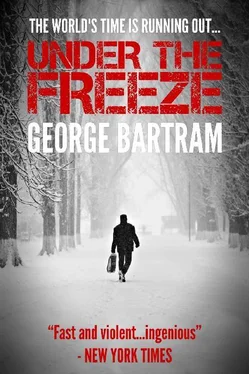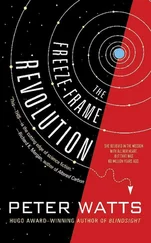The footsteps coming up the passage stopped. A shoe scuffed.
He could see their dark reflections in the slanted window. The angle was wrong for him to be able to see Carrington, who must have been back at the entrance.
“That bitches it,” a male voice said very low.
The two men began to run. At the other end, a car door slammed. Tarp fired the .22 as the men lumbered past him. He had aimed low; neither man paused, but two steps beyond him one of them gave an odd bouncing step, almost a hop, and then limped as he ran. As he did, the man farther away drew a gun from his overcoat pocket. It looked enormous. It was a big revolver, probably a .44 with a four-inch barrel, he thought.
The man was trying to fire while he ran, aiming behind him and trying not to hit his companion. He fired one shot, seemingly for the hell of it. Tarp was crouching in the doorway by then and he ducked under his own arms as glass shattered above him. The noise of the gun in the enclosed passage was hideous.
“Stop!” Johnnie shouted in his polite tenor. Then he said in an almost conversational tone, apparently to somebody with him, “One of them has a gun.”
From the other end of the passage came a squeal and a very loud thud. In seconds the situation had turned upside down; now it seemed to be the two gunmen who were on the run, with their way out blocked now by the arrival of the MI-5 car that Tarp had seen earlier.
Tarp shook glass from his back and peeped out under his arm. Johnnie Carrington was walking up the very middle of the passage, carrying a walkie-talkie. A man in a belted raincoat was walking up the far side, keeping pace with him. “No shooting,” he heard Carrington say into the device.
With that, there was another deafening shot from Tarp’s left, then another, and the man coming up the passage with Carrington gave an involuntary squeal, as if he had grabbed a hot pan handle. Tarp saw Carrington hesitate, and then his attention was taken by noise on his left as the two gunmen began to come back down the passage, one of them limping badly. He had a gun now, too, however.
They fired almost deliberately as they came. Somebody shouted. Glass erupted from a window across the way. Tarp put his back against the shop entry wall and kicked at a big piece of jagged plate glass that still stuck out of the frame like a tooth; then he put his foot on the chipped stone ledge and vaulted inward, knocking a display of extra-illustrated books into a pile of debris, striking a pasteboard wall that separated the window display from the shop within and taking it all with him as he went crashing through.
He crouched in the lee of the window, hearing glass explode and the big guns boom. The footsteps pounded past; there were more shots and a cry, and then silence.
Tarp raised his head.
“Mr. Carrington?” a small, tinny voice said. “Mr. Carrington, are you there?” It was the walkie-talkie.
Tarp got cautiously to his feet. He shook himself like a dog. He stepped up on the window ledge, hearing glass crunch under his weight; he shuffled into the display area of the window. The air felt cold as it blew through the glassless frames.
A car swung into the far end of the passage and shone its lights between the concrete posts. Somebody stood just at the edge of the dazzling beams and called, “Mr. Carrington? Mr. Carrington, are you there?”
“Down here!”
Tarp looked to his right.
The tracker who had come with Carrington lay almost in the center of the passage. Even in the watered glare of the headlights, it could be seen that he was lying in his own blood. Farther along, Johnnie Carrington was just sitting up. His left arm seemed to be of no use to him. He looked to be in shock, but he said, “Down here. Billups needs help, I think.”
The two gunmen were gone.
Tarp got out of the window and went to Johnnie. “Billups doesn’t need help,” he said.
“Oh, yes, he’s hurt.”
“He’s dead.”
Carrington looked up at him numbly. He tried to stand. Tarp reached for him and then saw what he had missed in the tricky light. Blood was spurting from Carrington’s sleeve.
“I was hit, you see…” he said.
Tarp grabbed for the arm, feeling for a pressure point and realizing sickeningly that where the bullet had hit there was no arm anymore. It had been almost severed, the bone and muscle blown through. Magnum . Softnose , he thought. Tarp jammed his own hand into the armpit, feeling for the pressure point, knowing that Carrington’s strong heart would pump his body empty of blood. He paid no attention to Carrington’s attempt to get up, gave no thought to being gentle with him; instead, he was thinking of the morning and his feeling of helplessness as he had tried to stop Juana’s bleeding. Now, he manhandled Johnnie Carrington, ripping back his silk-lined black overcoat and his dinner jacket and reaching into the sodden mass above the elbow to shut off the blood with a grip that in other circumstances could have killed.
“It’s Billups who needs—”
“Shut up.” Tarp turned to look into the headlights. “Down here!” he bellowed. “For Christ’s sake, get an ambulance down here!”
“I really must insist that you see to Billups,” Carrington said.
One moment they were alone in the peculiar light; the next, people swarmed around them. One was a woman. They all seemed confused. The death of Billups had unstrung them. One man was being sick by a shopfront. They looked like actors getting ready for a scene they had never rehearsed, carrying walkie-talkies and big flashlights like props they had never seen before.
“The chiefs hit.”
“It’s only his arm.”
“Poor Billups.”
“I can’t look. Poor Billups. Poor Harriet. Who’ll tell her? God, telling Harriet will be awful.”
The woman bent over Carrington. “We’ve called an ambulance, sir. Just in case.”
Just in case you don’t bleed to death in the next thirty seconds . Tarp kept the grip on the arm. The blood had slowed to a steady trickle.
“I should like to stand up,” Carrington said.
“Stay where you are,” Tarp growled. “Shut up.”
Lights flashed where the gunmen had got away, and somebody said disconsolately, “They got away.” He seemed surprised.
“How did that happen? I thought we had them.”
“The chief said no shooting. Then they started shooting.”
“Billups was armed.”
“Was he?”
“Wasn’t he?”
“He didn’t defend himself.”
“The chief said no shooting.”
“What about that car?”
“They rammed our vehicle and got clean off.”
“I thought Gregson was following.”
“He was, he was, but he lost them.”
“Oh, Christ.”
“What was all this about, anyway?”
People with a dolly came running. They alone seemed to know what to do, and they pushed the MI-5 folk out of the way like professionals moving among rank amateurs. They plunged a needle into Carrington’s good arm while another medic was tightening off the closure on the shattered one. One of them tried to peel Tarp’s fingers away.
“You can let go now,” he said, having been no more successful than if he had been a child try ing to loosen the hold of an adult.
“You sure?”
“Yes, please. Let him go now, would you? We want to get him to hospital.”
“What hospital?”
“Grimes.”
Tarp took his hand away. The wheeled stretcher began to roll.
“What’s the procedure here?” one of the MI-5 men was saying. “Don’t Metropolitan Police have to be called?”
“Don’s looking it up.”
“Well, doesn’t he know ? Christ, I was just assigned to this group; I’ve been in bloody Taiwan for three years. I’m an escape specialist. Come on, people, has anybody noticed that we have a dead man here?”
Читать дальше












